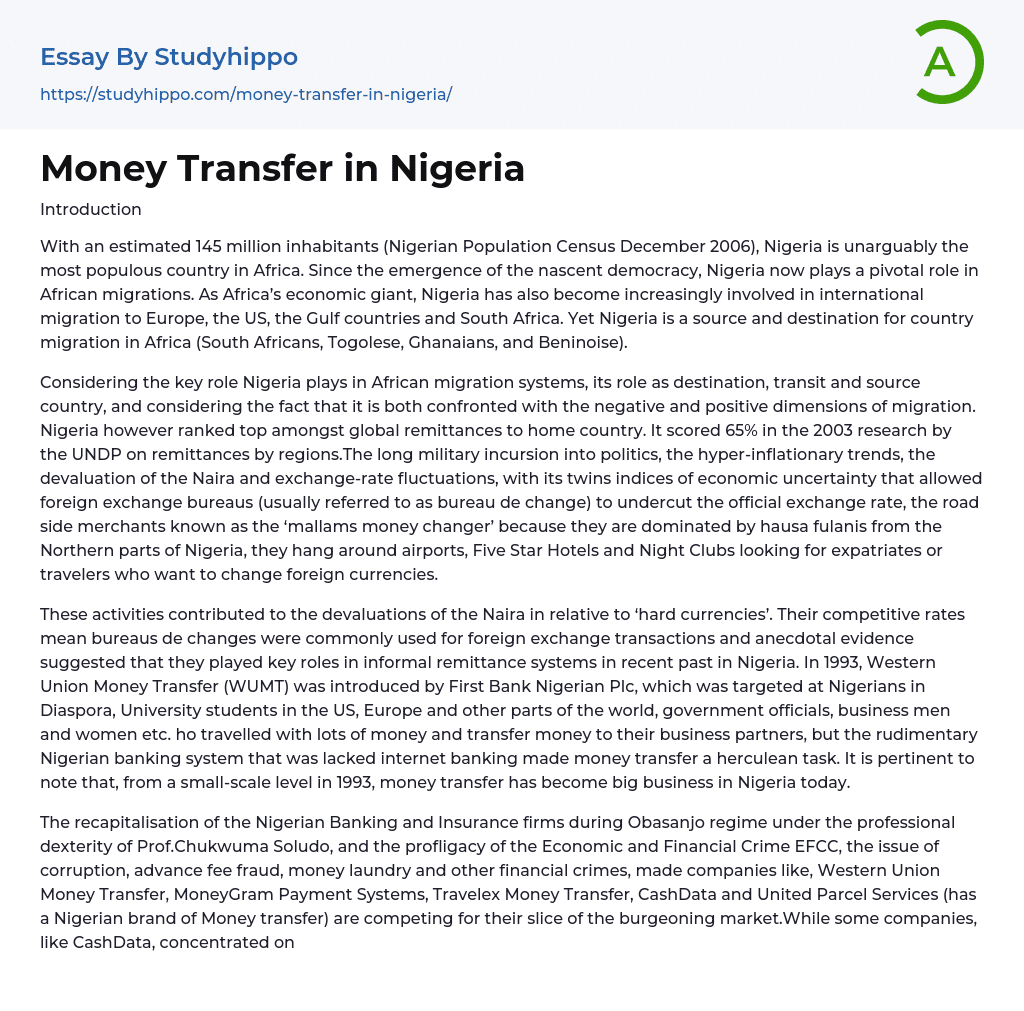Introduction
Nigeria, Africa's most populous nation with around 145 million residents (Nigerian Population Census December 2006), has become a major player in African migrations since the establishment of democracy.
Nigeria, the largest economy in Africa, is increasingly involved in international migration to various regions including Europe, the US, Gulf countries, and South Africa. Nigeria also experiences migration within Africa itself as both a source and destination country. Migrants come from countries such as South Africa, Togo, Ghana, and Benin. This migration brings both positive and negative aspects to Nigeria due to its role as a destination, transit point, and source country. Notably, Nigeria stands out globally for its remittance contributions with a 65% score in a 2003 UNDP research on regional remittances.
In Nigeria's economic landscape exist foreign exchange bureaus and roadside merchants known as "mallams money changer." These merchants mainly consist
...of Hausa Fulanis from Northern parts of the country. They can be found near airports, Five Star Hotels,and Night Clubs targeting expatriates or travelers looking to exchange foreign currencies. However,the presence of these merchants contributes to economic uncertainty caused by military interference in politics,hyper-inflationary trends,Naira devaluation,and fluctuations in exchange rates.
The activities mentioned contributed to the decrease in value of the Naira compared to other strong currencies. Bureaus de changes were often utilized for foreign exchange transactions because of their competitive rates. Anecdotal evidence suggests that these bureaus played important roles in informal remittance systems in Nigeria recently. In 1993, First Bank Nigerian Plc introduced Western Union Money Transfer (WUMT), which catered to Nigerians abroad, university students in the US and Europe, government officials, businesspeople, and others who needed to transfer large amounts of money. However, the
lack of internet banking in Nigeria at that time made money transfer a difficult task. It is worth mentioning that money transfer, which initially started on a small scale in 1993, has now developed into a significant industry in Nigeria.During Prof. Chukwuma Soludo's tenure, the Nigerian Banking and Insurance firms underwent recapitalization under the supervision of the Obasanjo regime. This process, along with the efforts of the Economic and Financial Crime EFCC, addressed issues of corruption, advance fee fraud, money laundering, and other financial crimes. As a result, companies such as Western Union Money Transfer, MoneyGram Payment Systems, Travelex Money Transfer, CashData, and Nigerian brand United Parcel Services entered the competitive market for financial services. While CashData focused on domestic operations, the thriving money transfer industry has now expanded globally, utilizing a vast network to remit funds worldwide.
The popularity of 419 scams has led to a need for increased security and trust in money transfer companies, such as Western Union, MoneyGram, and Travelex Money Transfer. Nigerians both living abroad and within the country rely on these companies to safely transfer money. Additionally, the issue of theft by employees of courier companies and NIPOST has also contributed to the dominance of multinational money transfer companies in Nigeria. The introduction of electronic transfer services has provided relief for Nigerians living abroad who wish to support their families, invest in businesses, and carry out projects in Nigeria. This method is widely regarded as the safest means of transferring money internationally. ACNeilsen's 2007 report indicates that the high-value customers engaged in international business within and outside Africa, as well as the A-B socio-economic class predominantly in government, telecoms, oil,
and gas sectors, form the most attractive customer demographic for money transfer businesses.
Western Union is the leading company in the market, while MoneyGram is one of its main competitors in the US. In 1997, MoneyGram entered Nigeria through a groundbreaking partnership with United Bank of Africa (UBA) under the guidance of Hakeem Osagie Bello, the former Chairman of UBA who received education at Harvard University. However, in Nigeria, MoneyGram's reputation as an international brand has not been upheld. This is because industry experts and financial analysts believe that its partnership with conservative banks like Union Banks, AfriBank, and Spring Bank Plc does not align with MoneyGram's brand image. Furthermore, some of their agents also collaborate with other money transfer agencies. For example, Union Bank is affiliated with Vigo, Travelex Money Transfer, and Ria Envia.
Apart from ETB, Bank PHB and UBA, other MoneyGram Agents in Nigeria are considered non-premium banking brands. UBA, ETB, and BankPHB have successfully established a clear MoneyGram brand. However, some agents do not maintain consistent use of the official pantone color of MoneyGram. During my experience with co-branding efforts between Western Union and MoneyGram in Ghana and Nigeria in 2003 and 2004, I observed that the agents did not replicate any of the branding materials. Instead, it was Western Union that ensured there was a consistent brand architecture.
- Human Migration essays
- Illegal Immigration essays
- Immigrants essays
- Migration essays
- Refugee essays
- Bank essays
- Banking essays
- Corporate Finance essays
- Credit Card essays
- Currency essays
- Debt essays
- Donation essays
- Enron Scandal essays
- Equity essays
- Financial Accounting essays
- Financial Crisis essays
- Financial News essays
- Financial Ratios essays
- Financial Services essays
- Forecasting essays
- Foreign Exchange Market essays
- Free Market essays
- Gold essays
- Investment essays
- Legacy essays
- Loan essays
- Market Segmentation essays
- Money essays
- Personal finance essays
- Purchasing essays
- Retirement essays
- Shareholder essays
- Stock Market essays
- Supply And Demand essays
- Venture Capital essays
- Nigeria essays
- South Africa essays




